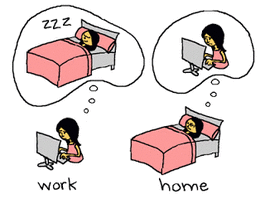My thoughts on breathing...
A bit more information as it occurs to me about how breathing impacts your health and well-being. If you have questions or want me to address a particular topic, please don't hesitate to contact me!
 Last week I talked about how dysfunctional breathing and sleep disturbances are linked and gave you a few exercises that may help with easing tension to facilitate a better night's sleep. Using the breathing exercises as a way to access and then ease muscle tension helps to turn off the ever-active "flight or fight" response we have to our everyday stresses and allows our bodies to spend time in "rest and digest" mode for more restful sleep. But for some, simple breathing exercises aren't enough. This is when we start to introduce behaviour changes to encourage better sleep hygiene. Described by Dr. Peter Hauri, sleep hygiene refers to "the habits, environmental factors, and practices that may influence the length and quality of one's sleep." The concept of sleep hygiene is to allow for a smooth transition between the hectic demands of your day and sleep. If you are dealing with stressors (work, family, etc) right up until the light's go off, it's unlikely you will have smooth transition to sleep. You simply cannot flip a switch and drop into blissful sleep. By establishing a pre-sleep ritual to break the connection between stress and sleep, we may limit the amount of time spent tossing and turning, waiting for sleep to come. We all did this with our kids when they were younger, right? Bath time, story time...everything meant to be done calmly and quietly to get them ready for bed. Why not offer ourselves the same courtesy? Here are a few tips to improve your sleep hygiene for a better night's sleep:
And don't forget to breathe! A nice, relaxed belly breathing pattern with an effortless exhale helps to settle that busy brain as you rattle through your "to-do" list. And if you struggle with finding that pattern, do try to find a physiotherapist with skills in treating dysfunctional breathing to help you find a pattern that works for you!
0 Comments
 Oh, to sleep like that! Oh, to sleep like that! You're lying in bed, eyes squeezed shut, breathing maybe a bit too quickly; you can definitely feel your heart beating and in your mind you are thinking "go to sleep. Big day tomorrow. Need to feel rested. Don't forget you have to pick up the kids early. Oh, and don't forget to mention to your boss about that meeting. Gosh, when will I fit a workout in do you think? What's the weather supposed to be like?..." And you open your eye, just a little bit, peek at the clock and realize you are STILL not asleep. Sound familiar? You're not alone. A 2011 study, found that over 40% of a sample of 2,000 Canadians had at least one symptom of insomnia. Insomnia is typically defined by the inability to fall asleep, stay asleep or the presence of "poor quality sleep." So if you are lying in bed at night, waiting and waiting and waiting to fall asleep, or you wake up in the middle of the night and can't fall back to sleep, or if you just feel exhausted when the alarm goes off, you may be experiencing insomnia. The consequences of chronic sleep deprivation are quite serious. Among the greatest health risk is the increase in the risk of accidents: those with insomnia are 2.5 to 4.5 times more likely to have an accident. Not enough sleep has been linked to impaired mood, memory and concentration and has even been shown to dampen immune systems. Yet despite the frequency of insomnia and the severity of side effects, few people are seeking adequate treatment: in the same study mentioned above, the authors noted that only 13% sought help from a health professional and 10% had used medication. Perhaps it is because this is such a common problem, that we have just grown accustomed to this being the new reality (I know you new parents out there are thinking that!). Among many of the treatment options out there, there is evidence to support both biofeedback and behavioural changes as an effective solution to insomnia. In my practice, where people come to me for help with dysfunctional breathing, there is often an underlying component of poor sleep. The story is almost always the same, in addition to breathing problems, there are issues with "busy brain" - those that think and worry all the time - and difficulties either falling asleep or staying asleep (or both). And what I have found is that for these people, they haven't experienced true rest for a very long time. Sure, they lay down, watch TV, read a book, maybe even meditate. But they very rarely, "let go." Tension in the jaw and neck, upper chest persists. Breathing rates stay high. The chest heaves up and down with each breath. There is no way the body can relax and let go if this is the pattern that dominates. I use a combination of biofeedback and breathing behaviour changes to try to restore what we call "physiological calm" - the true state of rest and relaxation. And more often than not, one of the responses I will get from my patients is that they are experiencing better sleep. The next time you find yourself lying in bed, mind chattering away at you, heart racing, try this simple exercise to bring your body back to a state of physiological calm:
|
AuthorI'm a physiotherapist who is passionate about educating anyone and everyone about the impact breathing has on our health. Archives
November 2020
Categories |